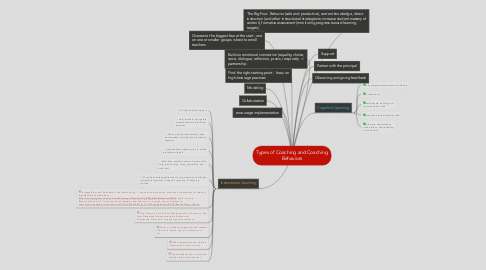Types of Coaching and Coaching Behaviors
by Sherri Dennstedt

1. Build an emotional connection (equality, choice, voice, dialogue, reflection, praxis, reciprocity = partnership
2. The Big Four: Behavior (safe and productive), content knowledge, direct instruction (and other instructional strategies to increase student mastery of content), formative assessment (monitoring progress toward learning targets)
3. Find the right starting point - focus on high-leverage practices
4. Overcome the biggest fear at the start - one on one or smaller groups is best to enroll teachers
5. Instructional Coaching
5.1. Professional Developers
5.2. Help teachers incorporate research-based instructional practices
5.3. When working with students, they demonstrate new effective practices to teachers.
5.4. Help teachers create a plan to realize professional goals
5.5. Must have excellent communication skills, build relationships, listen, empathize, and build trust
5.6. Must be knowledgeable about a large number of effective instructional practices in specific content or in teaching practice.
5.7. Increase Rigor and Relevance in the classroom by: 1. use various taxonomies, practices or frameworks for thinking - Rigor/Relevance Framework (http://cms.springbranchisd.com/LinkClick.aspx?fileticket=91qfFB2g6ks%3D&tabid=28203) and or revised Bloom's taxonomy. 2. Use instructional strategies and questions to increase rigor and relevance: https://docs.google.com/document/d/1dXgAP2EYuqRLcjPyCd_afZ7yzma86lsLq7wOZS0sBeo/edit?usp=sharing
5.8. Use Common Core ELA and Math standards of practice. Use Next Generation Science standards Science and Engineering Practices to increase rigor and relevance
5.9. Focus on student engagement and student interests to ensure rigor and relevance for all
5.10. Ask essential questions that are intriguing and raise curiosity
5.11. Teach students how to write and identify higher level questions
6. encourage implementation
7. Collaboration
8. Modeling
9. Cognitive Coaching
9.1. non-judgmental mediation of thinking
9.2. collaborative
9.3. relationship-building and communication skills
9.4. questioning and listening skills
9.5. planning conversations, observations, and reflecting conversations
10. Observing and giving feedback
11. Support
12. Partner with the principal


